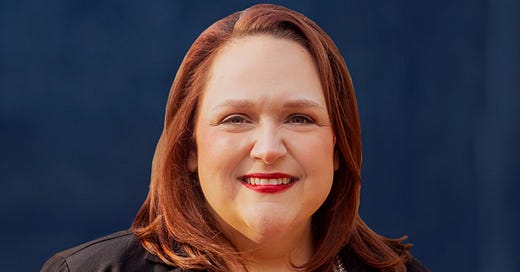Mississippi AG candidate looks to expand abortion protections
Greta Kemp Martin hopes to make statewide race competitive in red state
Elections for attorney general positions in southern states have taken on great importance since the demise of Roe v. Wade. In Mississippi, a reproductive rights advocate hopes to unseat a deeply conservative officeholder amid headlines that have shocked the country.
Mississippi Attorney General Lynn Fitch faces a matchup against Greta Kemp Martin, a 38-year-old lawyer from Belmont, a tiny town in the eastern part of the state. Fitch has sought to collect data on abortions from out-of-state providers who performed a procedure on or prescribed medication to women from Mississippi. She’s also sought to thwart medication abortion in the state.
Kemp Martin said she wants to create a more hospitable climate for doctors in a position where abortion is merited. She also called for more clarification from the state legislature on exceptions for abortion.
“I'm going to use my office and that bully pulpit to ensure that our legislature knows that, if they're going to have restrictive policies in place, they need to define the exceptions better,” Kemp Martin said.
Mississippi was also in the news because a middle schooler was a victim of rape and was forced to carry a child to term. The OB/GYN didn’t know how to work the exception. They didn’t know if they needed a police report. It was unclear how to enforce it.
“Even if we can figure out how to well-define these exceptions, we've created such a hostile place for abortion here in Mississippi that even when it's under these exceptions that they carve out, even when you fit inside these exceptions, you still cannot get the care you need,” Kemp Martin said.
Mississippi may seem like a state that is out-of-reach for Democrats, as does Alabama. In the modern era, there hasn’t been a sincere attempt from national operatives ever to put the state in play. There are roughly 2.95 million people who live in Mississippi. That’s smaller than most metropolitan areas.
Yet they have two Senators representing them. The possible benefit of making statewide elections there competitive could yield an outsized reward for Democrats. The widespread poverty there may also make Democratic policies salient.
Democrats nationally need to start making inroads in Southern states like Arkansas, Mississippi, and Alabama, if they intend to pass national laws protecting abortion rights. They need to convince voters that there needs to be protections up to a point and then permit abortions beyond it in some states if voters prefer those laws. Could Mississippi or Alabama voters ever support a candidate who would vote to codify Roe’s protections? That may seem far-fetched. But even with a little support for political network building, they may yield massive results.
The better question is whether Democrats could adjust or adapt rhetoric and messaging to appeal to southern voters or those in Texas. Soldiers in the Marine Corps are told to “adapt, improvise, and overcome.”
Adapt to the political situation and sensibilities. Improvise messaging and policy that appeals to them and upholds Democratic values. Then, overcome the political opposition in place there. That’s based on localizing political decision-making and campaigning. That could work in Mississippi as well as Texas.
Kemp Martin said she has her naysayers and people who call her horrible names. But the Dobbs decision has been unpopular in Mississippi. Fifty-one percent of voters disagree with it.
They get it,” she said. “It clicks. My favorite thing to try to connect with conservative voters is I like to say, ‘You can be pro-life though I hate that phrase. You can be pro-life and still be anti-Dobbs. You can be pro-life and understand that Dobbs went too far.”
“They receive that a lot better.”




